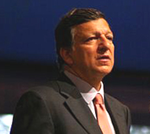 CaféBabel has an interview with Commission President Barroso (hat tip: European Union Law Blog) and they have a good go at him, which is refreshing to see.
CaféBabel has an interview with Commission President Barroso (hat tip: European Union Law Blog) and they have a good go at him, which is refreshing to see.
He declined to answer the question “Why didn’t you resign after the Irish referendum? It would have been a strong political message to the citizens” but he did answer “Don’t you feel too neutral regarding the crisis of the Irish ‘no’ to then Lisbon treaty?” and his answer is quite illustrative of the man – he states that he went to Dublin, met campaigners from both sides, and was there because the Irish government invited him. And if they had not invited him? Aside from a bland defence of the Treaty there’s little fire in Barroso’s answer, and no mention of Commissioner McCreevy’s behaviour (leading the way in my Blame Game). Weedy, weedy. You’re supposed to be the leader of the EU!
Barroso also says he would be happy to continue for a second term of office and that will be decided next year, something that I think would send all the wrong signals about the EU’s future.








http://www.lemonde.fr/opinions/article/2008/08/28/la-parole-aux-citoyens-par-thomas-ferenczi_1088854_3232.html
I thought Aherne was in a national corruption scandal, and the Mahon Tribunal. There’s a load at Wikipedia. I think he resigned so as to keep his own dodgy record away from the referendum campaign, although it clearly didn’t help much.
Fine, but didn’t Aherne resign about something entirely different?
As far as I remember he was very well respected in Portugal as a PM. I read about it once, but I can’t give more details. But just like Juncker may be in the future, I think he was also chosen, because his own people were satisfied with him.
I also think Barroso is just fulfilling his role. He could have replied to that second question though, but the first unanswered question seems rather sarcastic. Ahern resigned and it didn’t send a message that a majority really heard. I even doubt that Ahern resigning really had a noteworthy impact on the outcome in the end. And I do not think there was a reason for Barroso to resign. Of course, they all could have done more to promote the treaty, but it’s hard to tell how much the Commission is really supposed to do in a referendum situation in a single Member State. You on one hand want to promote your treaty, on the other hand you’re not supposed to interfere too much in national affairs. The ratification process on a national level is simply a national affair – no matter how much a decision on a national level can have an impact on the European Union.
Any Portuguese readers out there to help us? I have no idea how he was as PM…
Yes, you are right. He is not the charismatic person that could give a real face to a political European Union.
I wonder how he was as Prime Minister…?
Let’s put it like this: Jacques Delors would not have answered those questions in the same way.
Legally speaking Barroso is playing it by the book, and keeping the Member States happy by his low key approach. But politically he could do much more – it’s just that as an individual he’s never going to do that.
Is he really supposed to be the leader of the EU – or not rather the administrator? Isn’t he so dependent on member states that he prefers not to interfere in their affairs?
Politically spoken, I agree with your assessment. But institutionally spoken, isn’t Barroso fulfilling his role exactly in the way that the treaties and the political realities have assigned to him?
I also recommend the discussion to a recent article at the Grahnlaw blog.